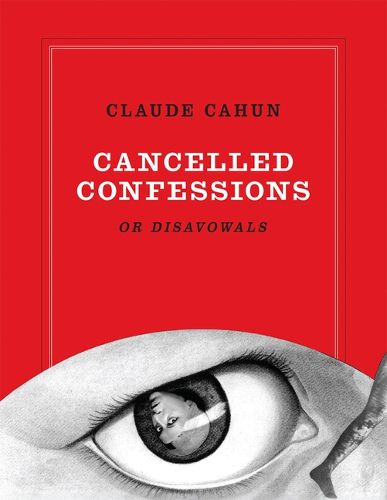Readings Newsletter
Become a Readings Member to make your shopping experience even easier.
Sign in or sign up for free!
You’re not far away from qualifying for FREE standard shipping within Australia
You’ve qualified for FREE standard shipping within Australia
The cart is loading…






Back in print after over a decade: the playful and genre-shattering memoir of a beloved surrealist known for her gender-bending portraiture
First published in 1930 by anti-fascist, avant-garde publisher Editions du Carrefour in Paris as Aveux non Avenus, Cancelled Confessions (or Disavowals) is Claude Cahun's wildly radical answer to an invitation to write a memoir. Shattering the very premise of the "memoir"--the singularity of identity--into sharp and prismatic fragments, Cahun assembles an ever-mutating inquiry into the instability of "self" and its many masks. Using a multitude of forms (fables, jokes, aphorisms, letters, dialogues, dreams, hymns, pronouncements, etc.), to plumb the subjects of desire, love, gender, sex, fear, faith, religion and vanity (among others), Cancelled Confessions (or Disavowals) is a tour-de-force work of resistance: it provokes the reader to enter the capacious, provocative, playful and deeply imaginative space constructed by Cahun in defiance of all categorization, to repudiate a delimited, censured world and embrace, instead, the outcasts and cast-offs, the unknowable and the unknown. Thoughtfully redesigned to emulate the original artist's book, this revised edition of the out-of-print English translation by Susan de Muth--originally published in the UK by the Tate in 2007 and in the US by MIT Press in 2008--includes novelist and critic Pierre Mac Orlan's original 1930 preface along with contemporary essays by scholar Amelia Groom and translator de Muth. Almost 100 years old, Cancelled Confessions is not only prescient, but urgent: "It is not enough to be vanquished, you also have to turn defeat to your advantage." Born in France in 1894, Claude Cahun (nee Lucy Renee Mathilde Schwob) was a writer, artist and anti-fascist activist, associated with the Surrealists, yet who was obscure for decades. Cahun's shape-shifting, gender-bending, "self" portraits--made in collaboration with Marcel Moore (nee Suzanne Malherbe, aka l'autre moi, "the other me")--feature Cahun in androgynous garb with shaved head, or elaborately costumed and adorned with makeup or masks, often with mirrors or doubling, always multiplying the "I." These are the most recognizable works in a highly subversive, multiform oeuvre that includes Aveux non Avenus (Cancelled Confessions) as well as more untranslated writings. Now embraced as a pioneer of queer and feminist expression and heralded for a daring and inventive, years-long resistance to the Nazi occupation of the Isle of Jersey, Cahun created art--and a life--that aimed to disrupt societal, political and artistic orthodoxies with courage, wit and imagination.
$9.00 standard shipping within Australia
FREE standard shipping within Australia for orders over $100.00
Express & International shipping calculated at checkout
Back in print after over a decade: the playful and genre-shattering memoir of a beloved surrealist known for her gender-bending portraiture
First published in 1930 by anti-fascist, avant-garde publisher Editions du Carrefour in Paris as Aveux non Avenus, Cancelled Confessions (or Disavowals) is Claude Cahun's wildly radical answer to an invitation to write a memoir. Shattering the very premise of the "memoir"--the singularity of identity--into sharp and prismatic fragments, Cahun assembles an ever-mutating inquiry into the instability of "self" and its many masks. Using a multitude of forms (fables, jokes, aphorisms, letters, dialogues, dreams, hymns, pronouncements, etc.), to plumb the subjects of desire, love, gender, sex, fear, faith, religion and vanity (among others), Cancelled Confessions (or Disavowals) is a tour-de-force work of resistance: it provokes the reader to enter the capacious, provocative, playful and deeply imaginative space constructed by Cahun in defiance of all categorization, to repudiate a delimited, censured world and embrace, instead, the outcasts and cast-offs, the unknowable and the unknown. Thoughtfully redesigned to emulate the original artist's book, this revised edition of the out-of-print English translation by Susan de Muth--originally published in the UK by the Tate in 2007 and in the US by MIT Press in 2008--includes novelist and critic Pierre Mac Orlan's original 1930 preface along with contemporary essays by scholar Amelia Groom and translator de Muth. Almost 100 years old, Cancelled Confessions is not only prescient, but urgent: "It is not enough to be vanquished, you also have to turn defeat to your advantage." Born in France in 1894, Claude Cahun (nee Lucy Renee Mathilde Schwob) was a writer, artist and anti-fascist activist, associated with the Surrealists, yet who was obscure for decades. Cahun's shape-shifting, gender-bending, "self" portraits--made in collaboration with Marcel Moore (nee Suzanne Malherbe, aka l'autre moi, "the other me")--feature Cahun in androgynous garb with shaved head, or elaborately costumed and adorned with makeup or masks, often with mirrors or doubling, always multiplying the "I." These are the most recognizable works in a highly subversive, multiform oeuvre that includes Aveux non Avenus (Cancelled Confessions) as well as more untranslated writings. Now embraced as a pioneer of queer and feminist expression and heralded for a daring and inventive, years-long resistance to the Nazi occupation of the Isle of Jersey, Cahun created art--and a life--that aimed to disrupt societal, political and artistic orthodoxies with courage, wit and imagination.